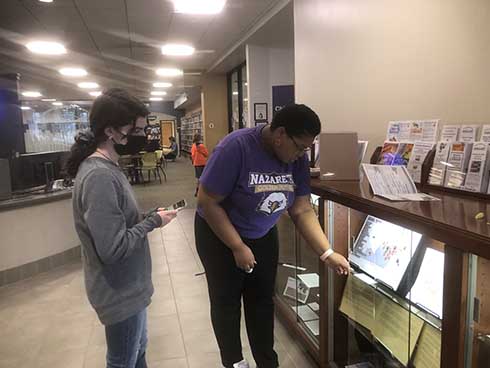Nazareth students curate exhibit to educate about the impact of redlining in neighborhoods
“I hope people will learn about their community's past and connect it to the present. The exhibit shows how redlining can affect a person’s wealth, mental health, and life expectancy.” — Arlene Lopez, graduate student
American Studies graduate student Arlene Lopez ’18, ’22G and public history student Jordyn Bagley ’24 curated the exhibit Confronting Relics of the Past: The History and Impact of Deed Restrictions and Redlining in Brighton, on display at the Brighton Memorial Library’s main lobby until April 30, as a project for Nazareth’s Center for Public History. The exhibit is an attempt to educate people about the racist language in many Brighton home deeds that segregated the community as part of redlining practices and racial property covenants.
Redlining — named for areas shaded red on federal maps — and racial covenants shaped who could and could not buy or rent property through laws, economic policies, and social practices in ways that have had enduring economic consequences.
“Being a New York City native, I always found it alarming how in a 10- to 15-minute drive, from Pittsford to Rochester’s inner city, you can see dramatic changes,” said Lopez, who earned a legal studies bachelor’s degree at Nazareth and works as a Naz Campus Safety communications officer. “Especially in the upkeep of the buildings and streets. It's like two separate worlds receiving not even close to the same treatment.”
Political Science and History Professor Timothy Kneeland, Ph.D., guided their work last semester with English Professor Ed Wiltse, other Nazareth students, local teacher and PathStone Foundation Antiracist Curriculum Project co-leader Shane Wiegand, and a group of citizen volunteers in Brighton’s Meadowbrook neighborhood called Confronting our Racist Deeds, aka CORD. After the semester ended, Lopez and Bagley were eager to continue with the project.
“I'm hoping that reading the racially restrictive language on the deeds and seeing the map will push people to look at their own deeds and take action like CORD,” said Bagley, who’s majoring in history and in museums, archives, & public history. “I believe in the power of education and it is important for people to have these difficult conversations to lead to change — as we have recently seen the right for students to receive information is being challenged.”
Both students say this exhibit is a must-see for Rochester residents and beyond.
“A lot of people learn the inhumane practices of the South. Yet, the North's wrongdoings are often overlooked and forgotten. This exhibit acknowledges a shadow history, ” said Lopez. “Rochestarians should know. I hope people will do further research and fight for change to better the circumstances and future generations.”
Related story:
Read about Arlene Lopez’ undergrad experiences: "Your voice can make a change"
Nazareth University is an inclusive community of inspired learners, educators, and changemakers who for 100 years have been driven by a bold commitment to action, empathy, equity, and leading innovation for the common good. Impact experiences are at the heart of a Nazareth education, preparing each student to discover within themselves the potential to cultivate positive change in their life's work, in any career field, and in a world that is constantly evolving and infinitely interconnected.
Our broad academic offerings present a range of study options typical of larger universities, yet achieved in our supportive campus culture. Nearly 2,100 undergrad and 600 graduate students enroll in degree and certificate programs and engage in collaborative, transformative learning experiences, preparing for the professions and society of today and tomorrow. In a learning community that purposefully integrates liberal arts and professional programs, Nazareth University graduates are able to launch a lifetime of impactful leadership in communities and workplaces near and far.

Nazareth students Jordyn Bagley '24 (left) and Arlene Lopez '18, '22G, work on setting up the exhibit in Brighton's Library.